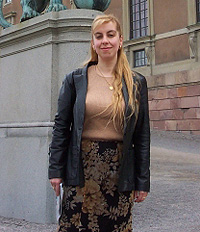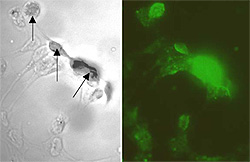FULL STORY
Einstein Researcher Recognized for Developing Novel Way to Treat Or Prevent Viral Cancers
June 16, 2008 - (BRONX, NY) - Research findings, presented at the Society for Nuclear Medicine's 55th annual meeting, show that radioimmunotherapy (RIT) targeting viral antigens offers a novel option to treat or even prevent many viral cancers by targeting cancer cells expressing viral antigens or infected cells before they convert into malignancy.
 "There is an urgent need to find new approaches to treating and preventing viral cancers," said Ekaterina (Kate) Dadachova, associate professor of nuclear medicine and of microbiology and immunology at Albert Einstein College of Medicine of Yeshiva University, who was the lead researcher of the study, "Viral Antigens as Novel Targets for Radioimmunotherapy of Viral Cancers."
"There is an urgent need to find new approaches to treating and preventing viral cancers," said Ekaterina (Kate) Dadachova, associate professor of nuclear medicine and of microbiology and immunology at Albert Einstein College of Medicine of Yeshiva University, who was the lead researcher of the study, "Viral Antigens as Novel Targets for Radioimmunotherapy of Viral Cancers."
She added, "The magnitude and global health-burden associated with viral cancers is only now being realized."
It is estimated that up to 25 percent of all cancers are currently linked to existing viral infections. Most of these cancers are extremely difficult to treat and cannot successfully be reduced or removed using conventional therapies or treatments. Viral cancers include cervical cancers caused by infection with a human papillomavirus (HPV), a sexually transmitted disease; hepatocellular carcinoma (HCC), a cancer of the liver; various lymphomas and carcomas in patients with AIDS/HIV; and other cancers.
 According to Dr. Dadachova, who is also the Sylvia and Robert S. Olnick Faculty Scholar in Cancer Research, this is the first time that researchers have attempted to target viral antigens on cancers, although the use of RIT for the treatment of cancer has been under development for thirty years. However, the targets of RIT therapy to date have included only "self" human antigens, which are overexpressed on the tumors but also expressed on normal tissues. Viral antigens, on the contrary, are expressed only on the tumors and nowhere else in the body.
According to Dr. Dadachova, who is also the Sylvia and Robert S. Olnick Faculty Scholar in Cancer Research, this is the first time that researchers have attempted to target viral antigens on cancers, although the use of RIT for the treatment of cancer has been under development for thirty years. However, the targets of RIT therapy to date have included only "self" human antigens, which are overexpressed on the tumors but also expressed on normal tissues. Viral antigens, on the contrary, are expressed only on the tumors and nowhere else in the body.
The idea to perform the study was suggested by Dr. Arturo Casadevall, chair of microbiology and immunology at Einstein, who collaborates with Dr. Dadachova on developing radioimmunotherapy of infectious diseases and cancers. The study involved treating experimental cervical cancer and hepatocellular carcinoma in nude mice with antibodies to respective viral antigens expressed on these tumors. The antibodies were radiolabeled with 188-Rheniuma powerful beta-emitting radionuclide.
"This study demonstrates a real possibility for more specifically targeted cancer treatments," said Dr. Dadachova. "Targeting those antigens with radiolabeled molecules offers exquisite specificity and will hopefully allow us to significantly increase the efficacy of treatment by administering more individualized doses while avoiding toxicity."
"Nuclear medicine and molecular imaging offer the ability to target disease on a truly molecular level that is unmatched by any other imaging or therapeutic modality," said Dr. Dadachova. "Targeting viral antigens with radiolabeled antibodies (or also with specific peptides or aptamers) will allow the extremely precise diagnosis of such cancers and their effective therapy. Furthermore, this approach will make possible 'molecular prevention' of viral cancers, when infected cells will be targeted before they become cancerous."
Dr. Dadachova and her team were also honored for this study by the Society for Nuclear Medicine's Young Professionals' Committee, which recognizes the contributions of significant studies to the fields of nuclear medicine and molecular imaging by young researchers. The Young Professionals' Committee Award was presented on Sunday, June 15, during a luncheon.
Dr. Dadachova's study was supported by the National Institutes of Health (NIH), Center for AIDS Research (CFAR) and Albert Einstein Cancer Center.
###
Other Top Stories
9/11 World Trade Center Exposure Linked to Heart Disease Among NYC Firefighters
On Becoming a Physician: New Einstein Students Receive White Coats and Stethoscopes
Novel Therapy for Acute Migraine Shows Promise in Phase 3 Clinical Trial
First Complete Wiring Diagram of an Animal's Nervous System
Multimillion Dollar NIH Grant to Help Reduce Opioid Use & Get Care to People Who Need It
NIH Grant Funds $23 Million Study of Diseases Affecting People Living with HIV
New TAILORx Data Guides Adjuvant Therapy in Younger Breast Cancer Patients
Einstein Celebrates Its 61st Commencement
Bolstering Biopsies: Testing Patients' Individual Cells to Guide Treatment



Tablet Blog